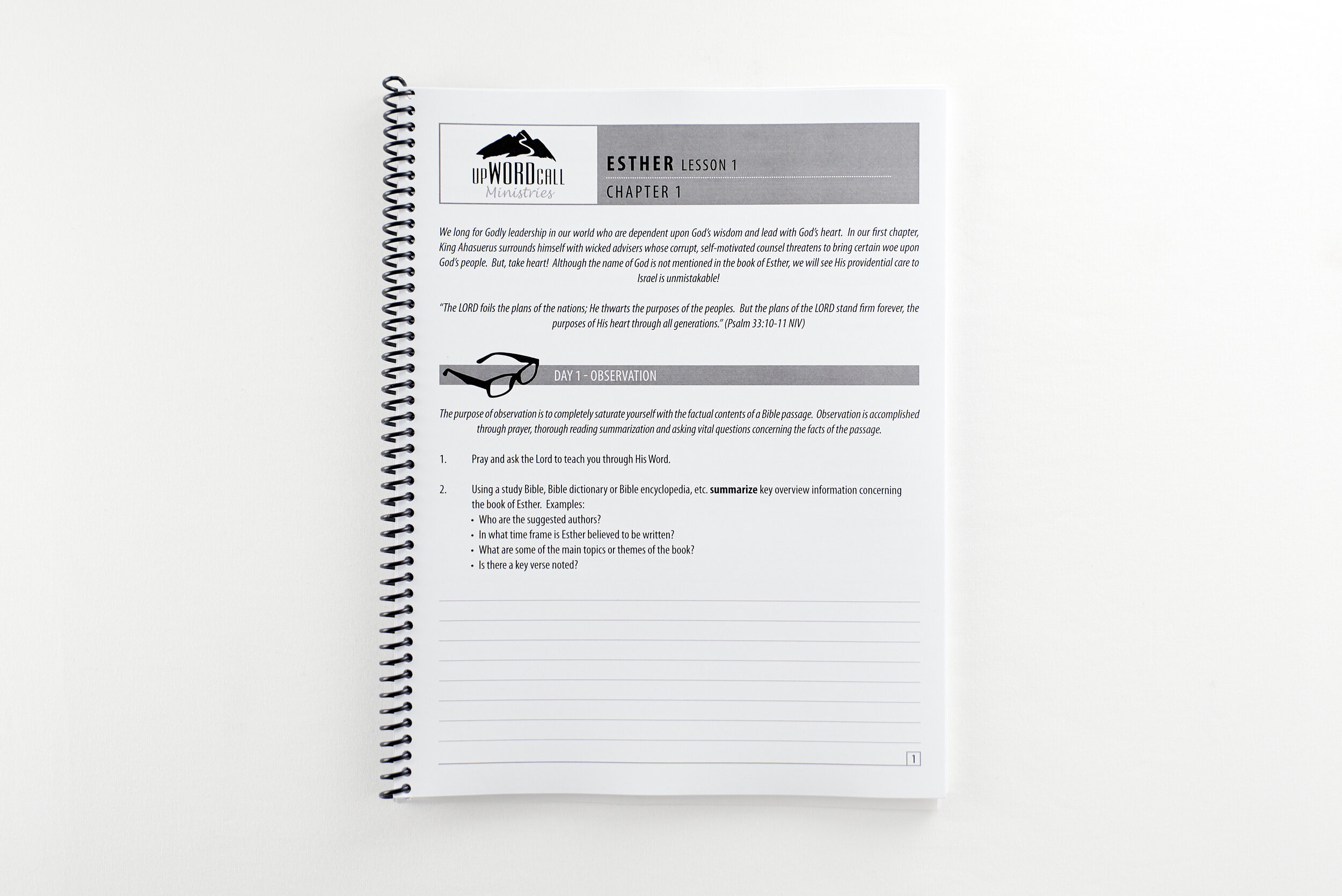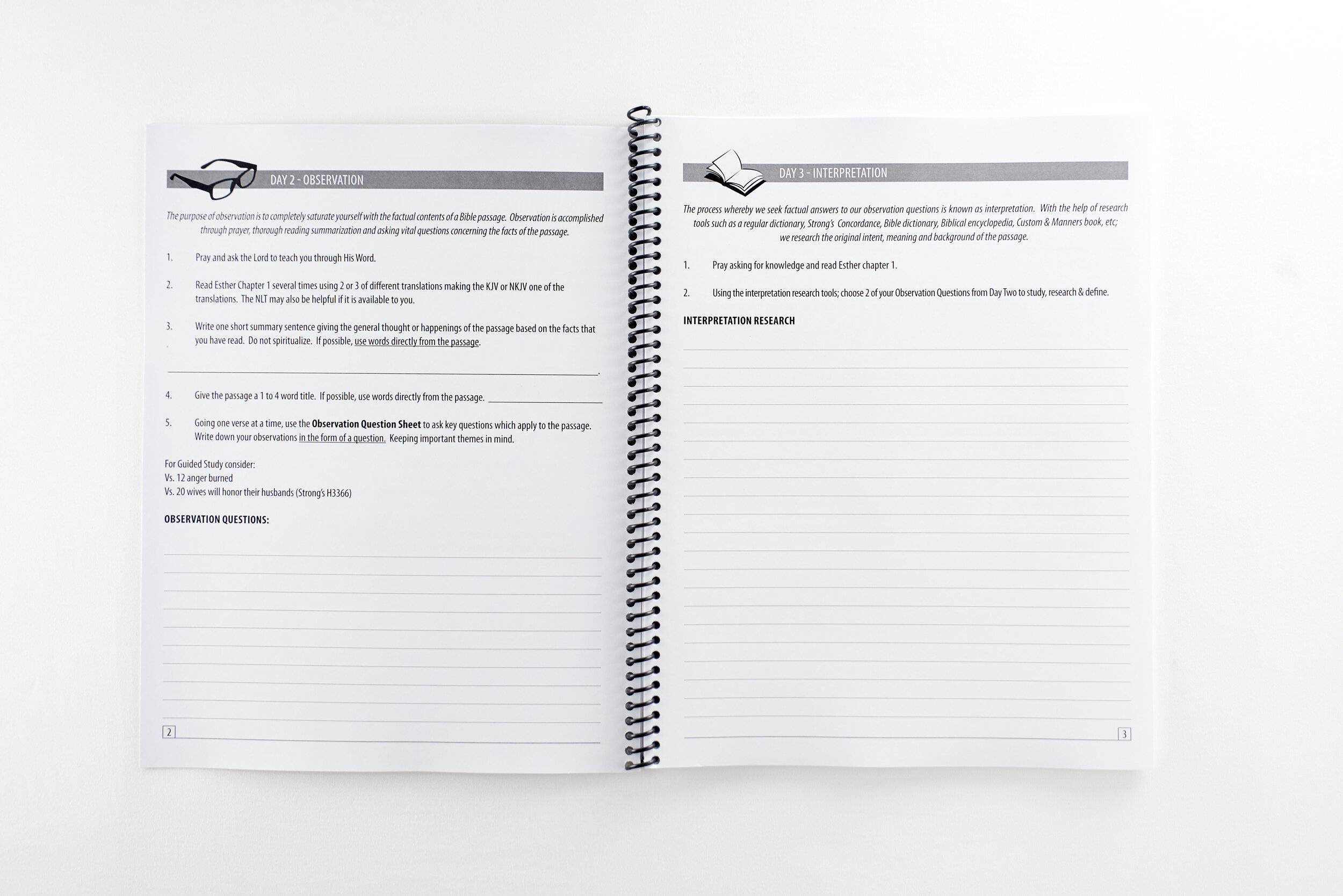 Image 1 of 5
Image 1 of 5

 Image 2 of 5
Image 2 of 5

 Image 3 of 5
Image 3 of 5

 Image 4 of 5
Image 4 of 5

 Image 5 of 5
Image 5 of 5






upWORDcall Inductive Homework - Esther
upWORDcall Inductive Bible Study homework is a companion to the upWORDcall Inductive Study Handbook.
This book of homework provides guided studies through the entire book of Esther. You will have ample space to write your Observations, Interpretations, Spiritualizations, and Personal/Practical research work.
New to inductive study or honing your skills? You will value the guided help this homework provides that corresponds with the upWORDcall Inductive Handbook. With it, you are sure to complete a solid and comprehensive inductive study for all of its 9 lessons. If you are a seasoned inductive student, you will appreciate the layout and space this homework provides for your written research.
The Esther Homework is 71 pages in length, 9 lessons in all, covering the entire book of Esther. Each lesson represents one week of homework. Written with group sharing in mind, you may also use it individually at your own pace.
Also provided is a separate copy of the 30 Observation Questions Sheet. This convenient 30 questions sheet will make your observations thorough and well organized.
The upWORDcall Esther Homework and the upWORDcall Handbook are excellent materials for men or women who desire to enrich their studies in God's Word using the inductive study method.
ESTHER
The book of Esther tells how a Jewish girl became the queen of Persia and saved her people from a plot to destroy them. She is assisted in this by her cousin and guardian, Mordecai. Like many Old Testament books, Esther is an anonymous work. The author may have been someone like Mordecai, who had access to historical documents and an interest in Jewish affairs
Esther belongs to the period after the Babylonian exile, when Persia had replaced Babylon as the ruling power. The story is set in Susa, one of the Persian capitals, during King Ahasuerus's reign, better known by his Greek name, Xerxes I (486–464 b.c.). Some Jews had returned to Jerusalem, where they enjoyed a reasonable amount of control over their own affairs. Others, like Esther and Mordecai, were still in exile. As a minority group, the Jews were viewed with suspicion and sometimes faced threats to their existence.
The themes of divine providence, human responsibility, and the absurdity of wickedness permeate this book. Interestingly, God is not mentioned by name in the book of Esther, but it clearly shows that, even when God is most hidden, He is still working to protect His chosen people.
The book of Esther also explains the origin of the Feast of Purim. This recorded knowledge ensured that Purim would be observed by all future generations of the Jewish people.
*Inductive Handbook sold separately. (Please contact me for large group orders)
upWORDcall Inductive Bible Study homework is a companion to the upWORDcall Inductive Study Handbook.
This book of homework provides guided studies through the entire book of Esther. You will have ample space to write your Observations, Interpretations, Spiritualizations, and Personal/Practical research work.
New to inductive study or honing your skills? You will value the guided help this homework provides that corresponds with the upWORDcall Inductive Handbook. With it, you are sure to complete a solid and comprehensive inductive study for all of its 9 lessons. If you are a seasoned inductive student, you will appreciate the layout and space this homework provides for your written research.
The Esther Homework is 71 pages in length, 9 lessons in all, covering the entire book of Esther. Each lesson represents one week of homework. Written with group sharing in mind, you may also use it individually at your own pace.
Also provided is a separate copy of the 30 Observation Questions Sheet. This convenient 30 questions sheet will make your observations thorough and well organized.
The upWORDcall Esther Homework and the upWORDcall Handbook are excellent materials for men or women who desire to enrich their studies in God's Word using the inductive study method.
ESTHER
The book of Esther tells how a Jewish girl became the queen of Persia and saved her people from a plot to destroy them. She is assisted in this by her cousin and guardian, Mordecai. Like many Old Testament books, Esther is an anonymous work. The author may have been someone like Mordecai, who had access to historical documents and an interest in Jewish affairs
Esther belongs to the period after the Babylonian exile, when Persia had replaced Babylon as the ruling power. The story is set in Susa, one of the Persian capitals, during King Ahasuerus's reign, better known by his Greek name, Xerxes I (486–464 b.c.). Some Jews had returned to Jerusalem, where they enjoyed a reasonable amount of control over their own affairs. Others, like Esther and Mordecai, were still in exile. As a minority group, the Jews were viewed with suspicion and sometimes faced threats to their existence.
The themes of divine providence, human responsibility, and the absurdity of wickedness permeate this book. Interestingly, God is not mentioned by name in the book of Esther, but it clearly shows that, even when God is most hidden, He is still working to protect His chosen people.
The book of Esther also explains the origin of the Feast of Purim. This recorded knowledge ensured that Purim would be observed by all future generations of the Jewish people.
*Inductive Handbook sold separately. (Please contact me for large group orders)

